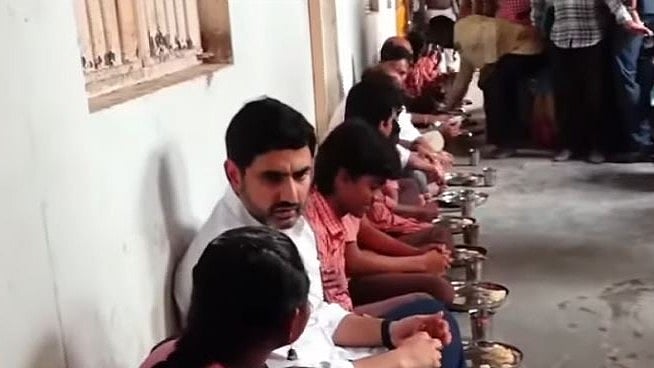
Screengrab of Andhra Minister Nara Lokesh partaking a mid-day meal with government junior college students.
Credit: YouTube/@tonenews
Hyderabad: A recent study by Hyderabad-based research institution People's Pulse has revealed widespread dissatisfaction with the newly introduced mid-day meal scheme in government junior colleges across Andhra Pradesh.
The programme, which was intended to promote student health and nutrition, has been plagued by multiple issues including financial constraints, poor meal quality, inconsistent monitoring, and a lack of accountability.
Students, parents, teachers, and other stakeholders have expressed disappointment with the implementation of the scheme, suggesting significant improvements are needed for the programme to achieve its intended goals.
Recognizing that a lack of food was causing a decline in attendance at government junior colleges, the Andhra Pradesh government launched the “Dokka Seethamma Mid-Day Meal Scheme.”
On January 4, 2025, Minister Nara Lokesh, inaugurated the scheme at Payakapuram Government Junior College, Vijayawada, while ministers, public representatives, and officials simultaneously launched the scheme in other parts of the state.
This initiative addresses the impact of poverty and hunger on education, ensuring that students receive nutritious meals to help them concentrate and thrive academically.
When the research teams asked about the mid-day meal scheme, 23.3 percent of students stated that it was good, while 49.7 percent said it was not satisfactory, and 27 percent expressed dissatisfaction. When questioned whether the mid-day meal was preferable to receiving mess charges directly, 83 percent favored the mid-day meal.
This clearly indicates that students expect better quality food from the government. During a visit to Penumaka Girls' College in Guntur, where Akshaya Patra supplies food, it was observed that the students left without eating. Since the food arrives at 10:30 in the morning and is consumed around noon, it often becomes cold and unappealing. This issue is prevalent in other colleges where private organizations supply food, said the report by People's Pulse.
Research teams visited 48 colleges
Researchers from People's Pulse visited 48 government junior colleges across various mandals, spanning from Rayalaseema to north Andhra, to assess the quality, hygiene, and infrastructure of the meals provided under the Dokka Seethamma Mid-Day Meal Scheme.
The study also gathered opinions from students regarding the scheme. As part of this comprehensive evaluation, a total of 1,200 samples were collected, with 25 samples taken from each college. The study meticulously examined the shortcomings of the scheme in detail.
During the research process, the researchers spent a minimum of four hours at each college, engaging in face-to-face interactions with students benefiting from the scheme, as well as with teachers, kitchen staff, and parents, to gather extensive and accurate information. This field study was conducted from February 15 to March 7, 2025.
The Dokka Seethamma Mid-Day Meal Scheme is named after “Dokka Seethamma,” revered as the daily breadwinner and Annapurna of the Godavari districts. Initially implemented for schools, the scheme has now been extended to intermediate colleges as well.
1.48lakh students benefiting from scheme
Currently, 1,48,419 students across 475 government junior colleges in the state are benefiting from the “Dokka Seethamma Mid-Day Meal Scheme”. As part of the implementation, 398 colleges have been linked to nearby government schools to facilitate meal distribution, while the remaining 77 colleges have been connected to centralized kitchens.
The government has allocated a budget of Rs. 29.39 crore for the scheme from January to March this year, and orders have been issued to allocate Rs. 85.84 crore for the next financial year.
“Proper funding is crucial for the successful implementation of any program. Unfortunately, due to the lack of sufficient funds for the “Dokka Seethamma” meal scheme, it is not possible to provide quality meals to students. Currently, the cost of vegetables is no less than Rs. 40 per kg, while a liter of quality cooking oil costs around Rs. 130. With the government allocating only Rs. 14.50 per student, it is impractical to provide nutritious and high-quality food. The limited funds are directly impacting the quality of vegetables and other food items used in the meals. As a result, students face several difficulties in consuming the food provided under the mid-day meal scheme and are often reluctant to eat it,” pointed the report.
Social audits, revise financial allocation
The People's Pulse research team observed that the government’s reliance on IVRS surveys creates a false impression of smooth implementation, while ground realities suggest otherwise. The team suggested conducting social audits regularly that would offer a transparent assessment of the scheme’s effectiveness and expose any instances of corruption, such as the past irregularities in chickpea supply.
Currently, the government allocates just Rs 14.50 per meal per student, which is grossly inadequate. Considering the rising costs and the need for quality nutrition, this amount should be increased to at least Rs 30 per meal the People's Pulse team suggested.